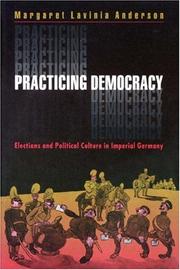| Listing 1 - 4 of 4 |
Sort by
|

ISBN: 0671025708 Year: 1999 Publisher: New York : Pocket books,
Abstract | Keywords | Export | Availability | Bookmark
 Loading...
Loading...Choose an application
- Reference Manager
- EndNote
- RefWorks (Direct export to RefWorks)
Carella, Steve (Fictitious character) --- 87th Precinct (Imaginary place) --- Police --- Fiction.
Book
ISBN: 981166238X 9811662371 Year: 2021 Publisher: Singapore : Springer Singapore Pte. Limited,
Abstract | Keywords | Export | Availability | Bookmark
 Loading...
Loading...Choose an application
- Reference Manager
- EndNote
- RefWorks (Direct export to RefWorks)
This open access book outlines new concepts, development models, governance and implementation processes capable of addressing the challenges of transformative urban regeneration of cities at precinct scale.
Urban & municipal planning --- Landscape art & architecture --- Human geography --- compact cities --- sustainable urban development --- urban infill --- precinct design --- precinct performance assessment --- design for climate change --- affordable housing --- low carbon cities --- water sensitive cities --- regenerative urban development --- Open Access

ISBN: 0691048541 0691048533 0691229538 9780691229539 Year: 2000 Publisher: Princeton, N.J. Princeton University Press
Abstract | Keywords | Export | Availability | Bookmark
 Loading...
Loading...Choose an application
- Reference Manager
- EndNote
- RefWorks (Direct export to RefWorks)
"What happens when manhood suffrage, a radically egalitarian institution, gets introduced into a deeply hierarchical society? In her sweeping history of Imperial Germany's electoral culture, Anderson shows how the sudden opportunity to "practice" democracy in 1867 opened up a free space in the land of Kaisers, generals, and Junkers. Originally designed to make voters susceptible to manipulation by the authorities, the suffrage's unintended consequence was to enmesh its participants in ever more democratic procedures and practices. The result was the growth of an increasingly democratic culture in the decades before 1914. Explicit comparisons with Britain, France, and America give us a vivid picture of the coercive pressures--from employers, clergy, and communities--that German voters faced, but also of the legalistic culture that shielded them from the fraud, bribery, and violence so characteristic of other early "franchise regimes." We emerge with a new sense that Germans were in no way less modern in the practice of democratic politics. Anderson, in fact, argues convincingly against the widely accepted notion that it was pre-war Germany's lack of democratic values and experience that ultimately led to Weimar's failure and the Third Reich. Practicing Democracy is a surprising reinterpretation of nineteenth- and early twentieth-century Germany and will engage historians concerned with the question of Germany's "special path" to modernity; sociologists interested in obedience, popular mobilization, and civil society; political scientists debating the relative role of institutions versus culture in the transition to democracy. By showing how political activity shaped and was shaped by the experiences of ordinary men and women, it conveys the excitement of democratic politics"--
Authoritarianism --- Democracy --- Elections --- Electoral politics --- Franchise --- Polls --- Political science --- Politics, Practical --- Plebiscite --- Political campaigns --- Representative government and representation --- Self-government --- Equality --- Republics --- Authority --- History --- Germany --- Politics and government --- History of Germany and Austria --- anno 1800-1899 --- anno 1910-1919 --- Elections. --- Democracy. --- Authoritarianism. --- Germany. --- Activism. --- Alsace-Lorraine. --- Amendment. --- Antisemitism. --- Backwardness. --- Ballot box. --- Ballot. --- Bribery. --- Bureaucrat. --- By-election. --- Calculation. --- Chairman. --- Civil service. --- Class conflict. --- Clergy. --- Comrade. --- Conservative Party (UK). --- Criticism. --- Deliberation. --- Democratization. --- East Prussia. --- Election commission. --- Election law. --- Election. --- Electoral district. --- Electoral fraud. --- Embarrassment. --- Employment. --- Federal republic. --- Fraud. --- Friedrich Naumann. --- Germans. --- Gerrymandering. --- Hostility. --- Ideology. --- Imperial Government. --- Imperial election. --- Incumbent. --- Injunction. --- Institution. --- Intimidation. --- Journeyman. --- Kulturkampf. --- Laborer. --- Landtag. --- Legislation. --- Legislator. --- Legislature. --- Local government. --- Loyalty. --- Mittelstand. --- Multi-party system. --- Newspaper. --- Ostracism. --- Otto von Bismarck. --- Party system. --- Political Catholicism. --- Political campaign. --- Political culture. --- Political party. --- Political science. --- Political spectrum. --- Politician. --- Politics. --- Polling place. --- Poor relief. --- Precinct. --- Prerogative. --- Proclamation. --- Proportional representation. --- Protest. --- Protestantism. --- Provision (contracting). --- Prussia. --- Public administration. --- Radicalism (historical). --- Regime. --- Requirement. --- Resignation. --- Robert von Puttkamer. --- Secret ballot. --- Simplicissimus. --- Skepticism. --- Social democracy. --- Socialist law. --- Society of Jesus. --- Suffrage. --- Supporter. --- Tariff. --- Tax. --- The Other Hand. --- Trade union. --- Uncertainty. --- Universal suffrage. --- Upper Silesia. --- Voting. --- Weimar Republic. --- West Prussia. --- Workplace. --- Alemania --- Ashkenaz --- BRD --- Bu̇gd Naĭramdakh German Uls --- Bundesrepublik Deutschland --- Deguo --- 德国 --- Deutsches Reich --- Deutschland --- Doitsu --- Doitsu Renpō Kyōwakoku --- Federal Republic of Germany --- Federalʹna Respublika Nimechchyny --- FRN --- Gėrman --- German Uls --- Герман Улс --- Germania --- Germanii︠a︡ --- Germanyah --- Gjermani --- Grossdeutsches Reich --- Jirmānīya --- KhBNGU --- Kholboony Bu̇gd Naĭramdakh German Uls --- Nimechchyna --- Repoblika Federalin'i Alemana --- República de Alemania --- República Federal de Alemania --- Republika Federal Alemmana --- Vācijā --- Veĭmarskai︠a︡ Respublika --- Weimar Republic --- Weimarer Republik --- ХБНГУ --- Германия --- جرمانيا --- ドイツ --- ドイツ連邦共和国 --- ドイツ レンポウ キョウワコク --- Germany (East) --- Germany (Territory under Allied occupation, 1945-1955) --- Germany (Territory under Allied occupation, 1945-1955 : British Zone) --- Germany (Territory under Allied occupation, 1945-1955 : French Zone) --- Germany (Territory under Allied occupation, 1945-1955 : Russian Zone) --- Germany (Territory under Allied occupation, 1945-1955 : U.S. Zone) --- Germany (West) --- Holy Roman Empire --- Europe
Book
ISBN: 192842435X 1928424341 Year: 2019 Publisher: Bloemfontein UJ Press
Abstract | Keywords | Export | Availability | Bookmark
 Loading...
Loading...Choose an application
- Reference Manager
- EndNote
- RefWorks (Direct export to RefWorks)
Much of the urban research focuses on the large metropolitan areas in South Africa. This book assesses spatial planning in the second-tier cities of the country. Secondary cities are vital as they perform essential regional, and in some cases, global economic roles and help to distribute the population of a country more evenly across its surface. Apartheid planning left South African cities fragmented segregated and with low densities. Post-apartheid policies aim to reverse these realities by emphasising integration, higher densities and upgrading. Achieving these aims has been challenging and often the historical patterns continue. The evidence shows that two opposing patterns prevail, namely increased densities and continued urban sprawl. This book presents ten case studies of spatial planning and spatial transformation in secondary cities of South Africa. The book frames these case studies against complexity theory and suggests that the post-apartheid response to apartheid planning represents a linear deviation from history. The ten case studies then reveal how difficult it is for local decision-makers to find appropriate responses and how current responses often result in contradictory results. Often these cities are highly vulnerable and they find it difficult to plan in the context of uncertainty. The book also highlights how these cities find it difficult to stand on their own against the influence of interest groups (property developers, mining companies, traditional authorities, other spheres of government). The main reasons include weak municipal finance statements, the dependence on national and provincial government for capital expenditure, limited investment in infrastructure maintenance, the lack of planning capacity, the inability to implement plans and the unintended and sometimes contrary outcomes of post-apartheid planning policies.
City & town planning - architectural aspects --- Secondary cities --- spatial transformation --- Secondary cities and research and policy in South Africa --- spatial planning --- Post-apartheid spatial policy --- complex spaces --- Complex adaptive systems --- Socioecological systems --- Implications for planning in complex systems --- Adaptive co-evolution --- Collaborative and adaptive planning and leadership --- Urban sprawl --- Gated estates --- Drakenstein Municipality’s spatial problems --- sprawl --- Policy for spatial containment --- Spatial planning for the Limpopo energy hub --- Mining booms and busts --- Settlement planning and housing policy for mining towns --- Infrastructure --- Spatial change --- Spatial transformation and complexity --- Complexity of planning in Mahikeng --- Planning in a difficult space --- Policy and planning frameworks --- Demographics --- Planning for spatial transformation --- Matjhabeng: planning in the face of the Free State Goldfields decline --- Context and changes in Matjhabeng --- Welkom’s economy and global market forces --- Spatial changes in Matjhabeng --- 1990–2013 --- Spatial planning in Matjhabeng: 1994–2018 --- The 2005/2006 spatial development framework --- The 2013 spatial development framework --- The 2015 Matjhabeng by-laws --- Precinct plans --- realistic plans in a situation of economic stagnation --- Mbombela: a growing provincial capital and tourism destination --- Spatial and population change --- Municipal infrastructure --- Main spatial challenges --- Spatial priorities and plans --- N4 Maputo corridor --- Participatory planning --- Balancing urban and rural land development --- Integrated development --- Msunduzi: spatially integrating Kwazulu-Natal’s diverse capital --- the contribution of the spatial development framework to spatial transformation --- Factors affecting spatial change in Polokwane Local Municipality --- Settlement hierarchy --- Corridors and transportation --- Water and sanitation infrastructure --- Spatial planning problems in Rustenburg --- Internal dynamics that hinder spatial transformation --- External dynamics that hinder spatial transformation --- Quality of the spatial development framework and planning process --- Spatial planning and complexity lessons --- Complexity as a lens to assess spatial planning instruments --- Interconnected nodes and car-free transport --- Optimal land use --- Resource custodianship --- Promotion of agriculture and food production --- and preservation of heritage --- Complexity in spatial planning for Stellenbosch Municipality --- complexity theory and spatial change
| Listing 1 - 4 of 4 |
Sort by
|

 Search
Search Feedback
Feedback About UniCat
About UniCat  Help
Help News
News